What is the importance of ISO 22301 Certification?
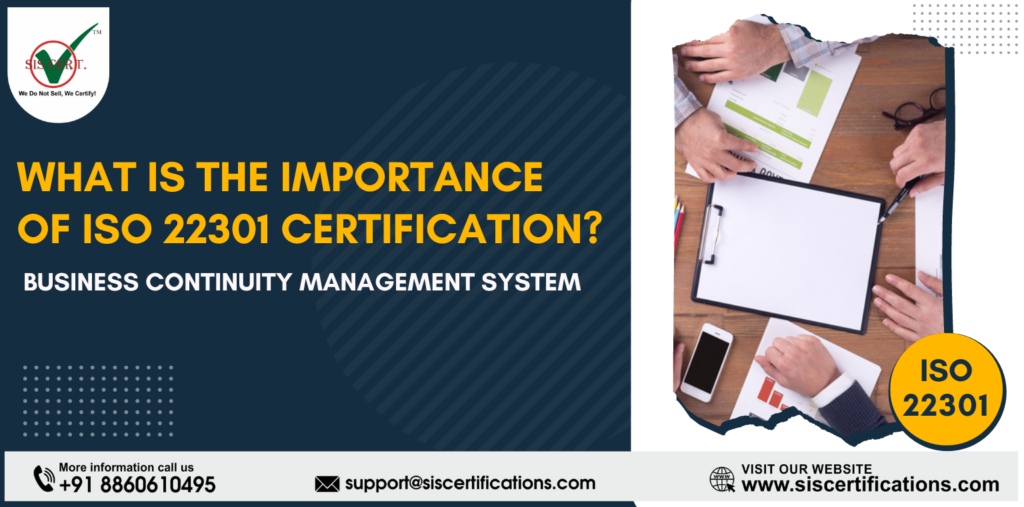
Businesses produce distinct goods and services to satisfy our needs and requirements. They adopt various technologies and techniques to meet customer’s needs and requirements. There are 7 billion people, and only around 5% of the total population are entrepreneurs globally. Business Continuity is critical as it enables an organization to operate at least at minimum levels during a crisis. Many events can hamper day-to-day business activities, such as cyber-attack, an outbreak of disease and natural calamities. A business continuity model offers the necessary tools and expertise to conduct business operations and formulates plans and strategies to eliminate business-related risks. What is ISO 22301 Certification? The ISO 22301 standard is an internationally accredited standard by the International Organization for Standardization. ISO 22301 is a standard for Business Continuity Management System. The ISO 22301 Certification provides a framework for business continuity management and aims to implement, maintain and improve a management system. It protects the organization against any business-related risk. ISO 22301 standards are the first standard for business continuity management and were last revised in 2019. The latest version of ISO 22301 standard is known as ISO 22301:2019. It integrated the ongoing changes to make it more user-friendly and holistic. What Importance of the ISO 22301 Certification?⮯ Business continuity management provides a resilient structure to the organization and saves money, time and reputation. The ISO 22301 standard for Business Continuity Management System is important for an organization in the following ways: Consumer satisfaction is one of the primary advantages of ISO 22301 Certification. ISO 22301 standards seek to deliver goods and services to meet customer’s needs and requirements even during a crisis. Offers you a plan to continue your services even after any disaster. Any unpredictable incident or disruption can lead to a loss in revenue and higher costs. An ISO 22301 standard secures a safe position in the market and helps you to continue your business operations and retain customers. Non-conformities are detected using the Plan-Do-Check-Action model. It requires an organization to have a contingency plan following incidents of disaster or unpredictable occurrences. The ISO 22301 Certification expands your consumer base and helps to win new businesses. It reduces the impact of incidents and improves your recovery time. It creates a better image of the organization among customers and potential business partners. It shows an organization’s capacity and efficacy in dealing with unpredictable incidents. Needs to take a proactive approach to minimize the impacts of threats and incidents on your organization. It requires an organization to review its internal operations frequently to detect potential risks. Unifies various local, national and international laws and regulations in a single standard and provides a framework for establishing Business Continuity Management. Increases the organization’s revenue and reduces costs. Business Continuity Management provides necessary tools and information to an organization to conduct minimal business activities during a crisis. It protects an organization’s assets and resources. The ISO 22301 standard provides training and guidance to your employees and improves the organization’s ability to address the unexpected. It mandates an organization to conduct fire drills and determine a recovery plan. Your organization follows a risk-based approach. ISO 22301 standards aim to identify and mitigate work-related risks. How to get ISO 22301 Certification Online ⮯ Getting an ISO certification makes your organization reliable and demonstrates the organization’s commitment and compliance with laws and regulations. It builds the confidence of your customers and potential business partners in your brand and makes your organization profitable. To get an ISO 22301 Certified, you can apply for an ISO 22301 certification using the SIS Certifications website. We offer certification courses for organizations as well as individuals. ISO 22301 Certification is a management standard for the organization to establish business continuity management. SIS Certifications also offer ISO 22301 training courses for individuals. An individual can apply for ISO 22301 lead auditor course and get the required skills and expertise to conduct ISO 22301 audit. How to Apply for ISO 22301 Certification ⮯ Achieving an ISO 22301 Certification in India is not difficult as SIS Certifications is one of the top 10 ISO 22301 Certifications bodies in India. We also offer other ISO standards, such as ISO 14001 Certification, ISO 9001 certification, ISO 45001 Certification, HACCP certification and many others. SIS Certifications have trusted clients in over 30 countries and operational offices in over 10 countries. It is a trusted certification body accredited by IAS, IAF and IAOS. It is a dedicated team of auditors and technical experts committed to helping you manage risks and access the global market. What is the Cost of ISO 22301 Certifications ⮯ The cost of ISO 22301 Certification varies from organization to organization. The ISO 22301 standard applies to any organization, large and small, regardless of size, nature and location. The cost of ISO 22301 certifications in India also depends on the Certification body you select. It also depends on many factors such as the size of your organization, the number of employees, the location of the organization, the number of branches an organization has and many others. Conclusion ✅ An ISO 22301 Certification demonstrates an organization’s ability to handle disasters, security threats and other incidents. ISO 22301 is one of the first standards for Business Continuity Management. It aims to provide a holistic framework for organizations to implement, maintain and improve the management system and protect against business-related risks. It enhances an organization’s reputation and offers a more resilient structure. It reduces costs by protecting the resources and assets of an organization and increases revenues. It prepares the organization to deal with unpredictable incidents as it focuses on guiding and training the employees so that they can protect their lives. Tags
Frequently Asked Questions About ISO Certifications
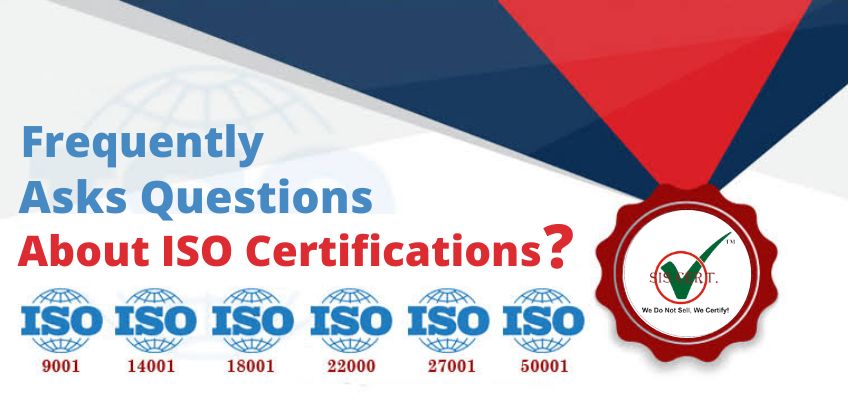
What does ISO certification mean? ⮯ ISO certification is a seal of approval of a third-party organization that a company performs in one of the developed international standards and issued by the International Organisation for Standardization (ISO). ISO is an independent international non-government organisation that brings together experts to share their knowledge and developing international standards which support innovation and deliver solutions to global challenges. Why would I need to become ISO certified? ⮯ ISO certification demonstrates to your key stakeholders that you have a well-managed, structured, stable and growth-ready company. Individual advantages of each ISO standard include: ISO 9001 prioritizes your clients. ISO 27001 provides protection for your systems, data and reputation. ISO 14001 cuts down on your environmental impact. The ISO 45001 standard helps keep your employees safe. ISO 22301 protects your enterprise from disturbances. The benefits common to all ISO standards are: Increased efficiency. Reduced costs Improved client satisfaction. More engaged workers. Reduced risks Reduction in insurance prices. Assistance in the tender process. By Applying ISO Certification, you demonstrate your organisation’s commitment to achieving your goals and enhance customer credibility and trust in your product or service. How much does it cost to become ISO certified? ⮯ ISO certification costs vary depending on the size of the organization and the level of operation of the business in terms of processes and procedures. If you choose to implement several standards at the same time, special fares are offered. We offer a simple and economical service with flexible terms and conditions. You can ask for a quotation here. Due to our tailor-made proposals and the number of variables which may affect the cost of implementation, we like to meet with our potential clients to better understand them before providing them with costs. What is ISO accreditation and is it different to ISO certification? ⮯ In principle, the systems are the same, it is a matter of knowing who certifies you and how. ISO accreditation or ISO certification is when the company has attained an ISO standard and/or a BS standard by a certification body which is accredited by IOAS and IAS or equivalent. Each country has a different version of IAS and IOAS and although they are not related to the government, they act as the governing body of the certification societies. ISO certification is only available once an accredited organization has been assessed and are unable to provide assistance or support, they can only complete the assessment and give you success or failure. However, ISO certification provider such as us can fully support you in your implementation. The support we offer includes templates for documentation, orientation during visits and phone support. We will also visit you twice a year; for a support visit to help you with the problems you are facing and for your annual recertification check. For many clients, certification is more than sufficient because it provides the necessary structure to improve their business and is well recognized. If ISO certification is required (e.g. if required by a potential client, professional association or regulatory body) we can provide ISO services to assist you in preparing your management system for evaluation by an accredited organisation. This increases your chances of successfully completing the evaluation once! Can I become an ISO-certified startup? ⮯ Yes! ISO certification is appropriate for any company How long is the validity of an ISO certificate? ⮯ All providers are different. Here at ISO Quality Services, our certificates are valid for one year and are subject to yearly recertification audits to ensure that you are still in compliance. As well, we conduct annual support visits to offer you additional support in areas where you are experiencing difficulties. The default of recertification is therefore rare. Read also: How to check the validity of ISO Certificate online We think it takes around three years for a management system to mature and at this point, more than 90% of clients recognize the value of their management system. Is there a way to test our certification before making a commitment to full certification? ⮯ Yes, you can have a better idea about ISO certification by: ISO training: You will learn how to fully implement and maintain an efficient management system to its maximum potential. ISO advice: We can perform a GAP analysis, helping to identify where you are now and where you should be in order to achieve compliance. When you are appointed, you will benefit from the advice and support of our consultants. How do you support me throughout that process? ⮯ We are proud of the support we provide to our clients from initial assessment to ISO certification and beyond. We will give you all the support necessary to include: A Designated Account Manager:You will be assigned an Account Manager who will be on hand to assist you with any questions you may have regarding the day-to-day operation of your Management Standard. Access to our Client Area:There is a wealth of information about our Customer Space, including forms, templates, guidance notes, including webinars and video tutorials. Annual Support Visits:Our annual support visits are here to offer you extra support in areas where you feel less confident whether it is a matter of ensuring that you are compliant for your next certification renewal audit or whether you need help organizing a management review meeting. These tours are fully flexible and guided by you to ensure you feel confident in the day-to-day operation of your management system. ISO Training:All our training courses are designed to build your understanding and ability to manage an efficient management system. If you want to learn about each item individually or better understand a particular issue, we offer in-person and online training for various learning styles. If you feel you could benefit from additional support, we also offer personalized ISO guidance. Like annual support visits, these counselling days will be directed by you and can cover a variety of topics. For example, you may want to upgrade your existing systems, need additional support with your audit system, or no longer have the in-house skills
How to check the Validity of ISO Certificate Online
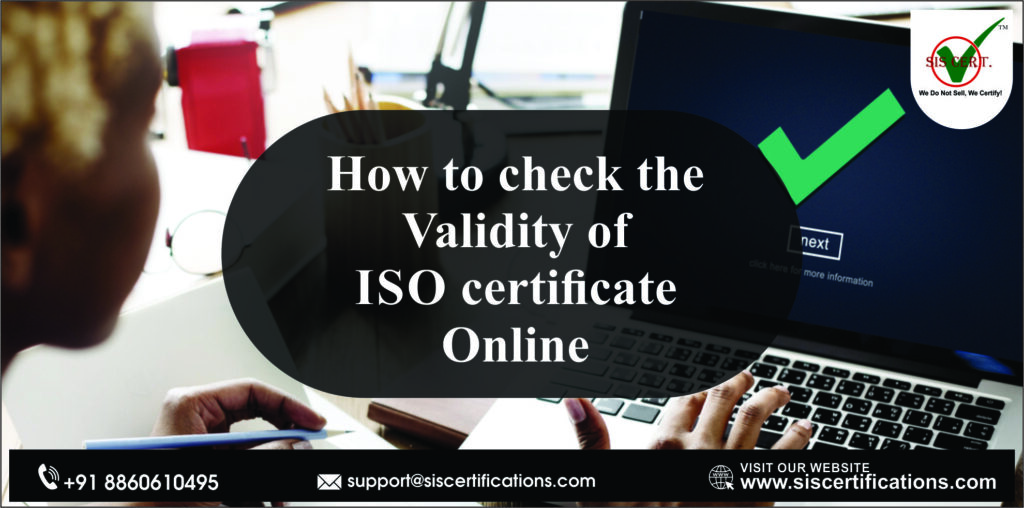
WHAT IS ISO CERTIFICATION? ⮯ ISO certification benefits all organizations regardless of their size, whether large or small. ISO represents the International Organization for Standardization, a nongovernmental organization that develops standards for products and services’ quality, safety, and effectiveness. Thus, ISO is a significant accomplishment for each company. The International Organization for Standardization is a worldwide organization responsible for establishing various global quality management standards. If you are looking for how to check the validity of ISO certificates online, then you are at the right place. Visit Us. It includes standards bodies representing different countries that design and publishes a broad range of exclusive, industrial and commercial standards. ISO standards cover everything from healthcare to technology, manufacturing, safety and the environment. The ISO plays a significant role in facilitating world trade by establishing common standards. VALIDITY OF ISO CERTIFICATION ONLINE ⮯ The International Organization for Standardization (ISO) sets various commodities and services standards. To receive an ISO certificate in India, the certification body must first be certified by the national accreditation body and subsequently certified by the IAF. An organization seeking ISO must follow the standards it has established. Therefore, an organization frequently calls upon an ISO expert to review its compliance with ISO standards. If a company complies, the verifier issues an ISO certificate; otherwise, the company has time to fill the gaps by becoming compliant before issuing a certificate. Service providers can manufacture ISO to offset costs associated with obtaining an authentic ISO certificate. As a result, many customers are interested in knowing whether or not their supplier has an authentic ISO certificate. In addition, sometimes, companies must verify their authenticity to determine renewal requirements. VARIOUS METHODS OF VERIFICATION FOR THE VALIDITY OF AN ISO CERTIFICATE. ⮯ Go to the IAF website and select IAF Members and Signers from the drop-down menu. Choose the right nation to find that which you are looking for. A new page is displayed with information on the national accrediting organization. Where the identity of the accreditation body on the ISO certificate is not on the list of accreditation bodies in that country, the ISO certificate shall be void and of no effect. In addition, verification by the certification body that issued the certificate may be conducted on the accreditation body’s website. If the names are not listed on the accreditation body’s website, it is not certified, making the certificate illegitimate If the name of the certified organization appears on the website, this means that the organization is authorized. However, the accreditation body’s Web site may also be used to verify the certificate’s authenticity. If the accreditation authority has no official documents, they may be sent by post to determine the authenticity of the ISO certificate. If there is no online database or Accreditation Committee response, please e-mail [email protected] and [email protected]. In conclusion, Given the numerous instances of ISO certificate forgery, it is essential to verify the validity of an ISO certification. CHECK ISO CERTIFICATION ⮯ Certification can be a helpful tool for adding credibility, demonstrating that your product or service meets your customers’ expectations. Some sectors have legal or contractual requirements. ISO itself is not responsible for issuing certificates; it has only prescribed those international standards. External bodies exist to carry out ISO audits and issue certificates to organizations. HIERARCHY OF CERTIFICATION ⮯ IAF- The International Accreditation Forum (IAF) is the highest-ranking accreditation organization. The IAF is the worldwide association of conformity assessment accreditation bodies and other bodies involved in evaluating standards. The main objective of this organization is to develop a compliance assessment program around the world so that consumers can rely on accredited certificates. Accreditation Board- Secondly, the hierarchy is subject to the accreditation board, specific to each country. Each country has its accreditation board. In India, it is referred to as the National Accreditation Board for Certification Bodies (NABCB). Certification Bodies- The certification bodies responsible for issuing standards certificates to enterprises and organizations exist at the last level of the hierarchy. Such bodies shall be members of their national accreditation committees. CHECKING VALIDITY OF ISO CERTIFICATION ⮯ There may be times when companies have to verify that their ISO certificates are valid. Sometimes a service provider will falsify a certificate to avoid the costs associated with obtaining ISO. The certification process works because ISO issues some standards for goods and services. An organization seeking ISO 9001 or ISO/IEC 27001 Certificate must meet these standards. According to this, the company or organization hires a company that evaluates whether the organization complies with ISO standards. HOW TO CHECK WHETHER ISO 9001 IS VALID? ⮯ The first step when assessing a potential supplier based on its ISO 9001 certification is to request that they give you a copy of the actual certificate. Once you have it, you can carry out the following verifications- Only registrars have the authority to issue ISO 9001 certificates. An organization is not allowed to issue a certificate itself. Find out who the accreditation organization is. If you see a stamp from an accreditation organization, you can find out if that accreditation organization is a member of the International Accreditation Forum (IAF). If an accreditation body is not stamped on the certificate, you should be suspicious about whether the registrar is competent to verify. A registrar may choose not to apply for certification, but this may or may not indicate their capacity and competence. Tags
ISO 9001:2015 MANDATORY DOCUMENTATION LIST
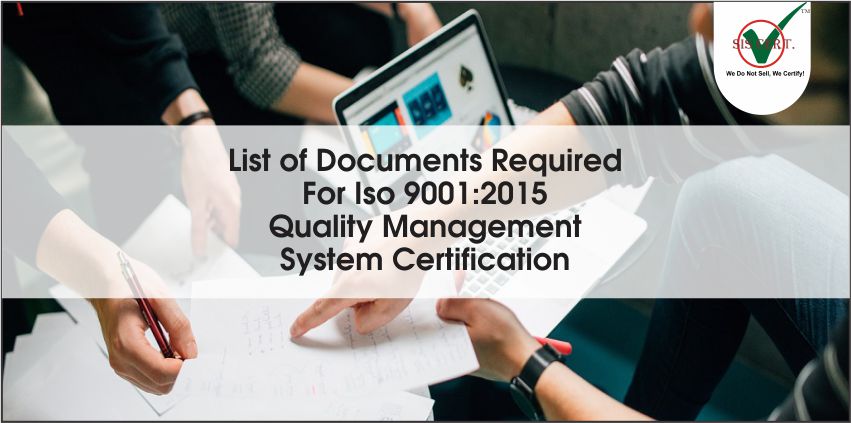
Don’t be discouraged by the number of ISO 9001 procedures, because not all of them apply to your business or are mandatory. The 2008 edition included 6 mandatory policies necessary to get the certification. That’s not happening anymore. The 2015 version – ISO 9001:2015 has brought about some changes, so it is important to be aware of the things that are mandatory in this revision. The 2015 edition offers much more flexibility in terms of documentation requirements. We review the reports stated in the standard that are mandatory for your organization to achieve ISO certification. We, therefore, present the ISO 9001:2015 mandatory documentation list. Besides the required documents, you will find the most commonly used paper for the application of the Quality Management System. List of Documentation required to become ISO 9001 Certification ⮯ Here are the documents you must submit if you want to comply with ISO 9001 Certification Quality Management System. Please note: Certain papers will not be mandatory if the company does not carry out the relevant processes. MASTER LIST 1 Quality Manual 2 List of Internal & External Issues 3 List of interested parties and their requirements 4 Documented Scope 5 Sequence & Interaction Chart and Process Flow Diagram 6 Quality Policy 7 Organization Roles, Responsibility & Authority and KPIs 8 Risk & Opportunities 9 Legal Register 10 Quality Objectives 11 List of Resource & People 12 Competence, Training and Awareness records 13 List of Monitoring & Measuring Resources 14 Calibration Document 15 Maintenance & Breakdown Records 16 Document for Organization Knowledge 17 Control of papers and Records 18 Procurement & their Record 19 Competence, training and awareness 20 Design and Development & their Records 21 Steps for control of externally provided processes, products and services (outsourced processes) 22 Procedure for production and service provision 23 Product & Service Specification 24 Procedure for Review of the requirements for products and services 25 Changes to requirements for products and services 26 Procedure for property belonging to customers or external providers 27 Control of changes 28 Procedure for internal audit 29 Management review 30 Operation Planning & Control for each department 31 Procedure for Compliance Obligation 32 Customer enquiries, contracts, orders, feedback & complaints 33 Criteria for evaluation and selection of suppliers 34 Identification & Traceability Record 35 Non-conformance & Corrective Action Record 36 Internal Audit Record 37 Management Review Record 38 Sales Order & Purchase Order These are the mandatory clauses that require you to provide documentation and reports in order to become ISO 9001 certified. Your reports will come in a variety of forms, such as spreadsheets, charts, videos and written content. The ISO 9001:2015 mandatory documentation list asks you to have a system that controls your records. We note that retention policies will be needed to establish the retention period for records. Tags
How to Start a Spice Business in India
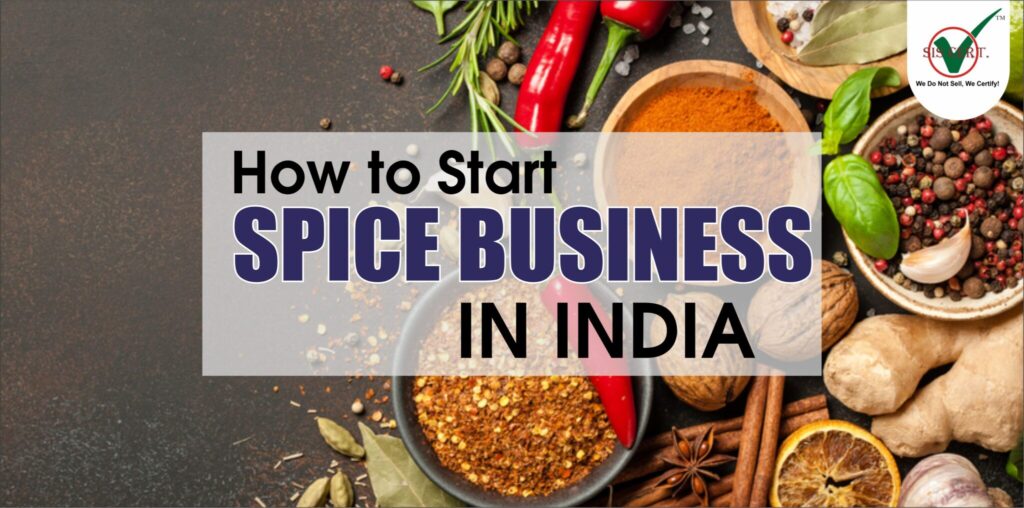
We Indians are insane when it comes to food. We are divided through states, but one thing that keeps us connected is “Spices”. The spices strongly influence our every festival, event and even everyday lifestyle. Therefore, for your knowledge, we present you with a blog where we talked about the 7 processes of starting a spice business in India. India is a prominent spice producer and exporter. It is also recognized as a profitable company within India. Anyone can start this business as a small, medium and large-scale base depending on their investment capacity. Spice powder is an essential ingredient in cooking. None of the Indian food is made without it. Let’s begin with an in-depth understanding of the spice business in India. MARKET OPPORTUNITY FOR SPICE BUSINESS IN INDIA ⮯ India is known as “the home of spices”, an Indian spice sought globally because of its taste, texture, aroma and medicinal properties. India produces approximately 75 of the 109 varieties listed by the International Organization for Standardization and represents almost half of the global trade. It is the number one exporter of this product. Its internal demand is thriving since it is a mass consumer product mainly used in culinary products or food seasonings. With varying lifestyles and particularly with changes in dietary habits and increased incomes, these use has increased. There is a requirement for various certificates or permits to start the business. 7 FACTS ABOUT STARTING A SPICE BUSINESS IN INDIA. ⮯ To set up this business in India successfully, you need to know the following facts: COSTS ASSOCIATED WITH THE BUSINESS: ⮯ The Indian market is expected to reach approximately $18 billion by 2020. India is the largest producer, producing 50 different spices that people seek for ready-to-use food, and this powder makes their cooking more accessible. Few important cost considerations are highlighted in this respect. These are practical to use, and it saves time and physical effort in preparing different delicious cuisines. Every commercial food industry, such as hotels, restaurants, catering and many others, uses these powders daily. This powder makes it an easy and profitable business to start, and you can start that business with small investments. Initial investment: INR 50000 to INR 100000. Space requirement: 250 square metres. Profit Percentage: between 50% and 70% Income: Average sales of 100 kg/day, from 50,000 to 150,000 per month. Other additional expenditures will include equipment maintenance, employee salaries and marketing fees. LICENSING REQUIREMENTS: ⮯ Since spice powder falls under the food category, it must therefore comply with a wide range of government regulations, including: The registration of the enterprise must be carried out on the scale of the business, if it is Pvt. Ltd. or partnership or sole proprietorship. The company shall be recorded accordingly. Registration of the GST is also essential for getting a GST number. With an SME, companies may register and get facilities and grants from the state government. Get a commercial licence, FSSAI and apply for a trade-mark, Udyam/MSME Registration BIS and IEC certification. Businesses must get ISO 9001 certification for ensuring efficient products and services to the customers. It is recommended to get the AGMARK certificate. SPACE REQUIREMENTS: ⮯ You don’t need a massive space to start the business, about 250 square meters can be used for processing pieces, and another 250 squares is required for packaging. Check the commercial space or basic conveniences such as water, electricity, etc. The state government has restrictions on starting the food business from home, so make sure the location is under the government’s law. Ensure the site is convenient and easily accessible to the target market. RAW MATERIALS REQUIRED: ⮯ The essential ingredients required in this powder are unrounded products, and with raw materials, you will need wrapping materials that will act as a shield for the powder. MACHINERY UTILIZATION: ⮯ The grinding machine is the machinery required in this business. According to the scale of industries, the equipment is employed. Large-scale industries use the impact pulverizer machine, while small-scale industries use the two-stage pulverizer. Other machines like spice mill, balance, packing machine, compressor, and the roster are also required. MANUFACTURING PROCESS: ⮯ CLEANING: It is a very initial process for the production in which the unrounded material are cleaned manually by eliminating impurities such as stone, dust and dirt. DRYING: After cleansing and washing them, display them in full sun to dry. The quality of the powder will depend on the well-dried product. If cleaning and washing do not occur, it will lead to bacteria that poison food. ROASTING: Once it is dry, they proceed through the roasting process. Roasting is essential as it will help to give flavour, colour and good taste to the powder. GRINDING: The grinder is used for pulverization to convert spices into powder. GRADING: Grading is a process that provides the basis for the inclusion and proportion of mixed with the raw material used. It also depends on the spices (aroma), size, shape, density and colour. SIEVING: Make sure the powder has a consistent mesh. PACKING THE PRODUCT: ⮯ Seasonings and spices add a lot of flavour to your favourite foods, but they must be fresh to make their magic work, so proper packaging is mandatory. Protect and keep the spices and seasonings with zip pockets, and these packaging bags will give you the flexibility of choosing the best size, style and characteristics for the product. Choose from options such as gas release valves, teargas notches, heavy-duty zippers, suspension holes, spouts, and various styles that give you lots of space to bring the brand to life. Once it is converted into powder, then the quantity-weighted has to package. These are then packaged in a polythene pouch and sealed using the sealing machine. The pouches will protect the product from moisture, perforation, odour and more. You guarantee that your seasonings and spices are safe from the warehouse to your customers’ taste buds. Tags
How to Start a Food business in India

Food is a fundamental need for people in all countries. Everybody loves to eat. This love is the main reason the food business has flourished worldwide. It is the need for nearly all living organisms, so there will always be a demand for it. For this reason, the Indian and international food industries will always be profitable. Keeping all this in mind, many people are thinking that how to start food business India and other countries. However, before we do that, we must all understand this industry. Many people find registration and licensing for the food business in India complicated. Therefore, we are offering you this guide. This guide provides a detailed description of starting a business in India. Understanding the food business in india ⮯ Every enterprise that manufactures, imports, processes, packages, stores, distributes or sells edibles in India is a food industry. These industries offer the following services to the public: Catering and dining services. Bake house and café. Sweetshops and Truck for Food. Delivery services. Household occupation, etc. Today, like all other businesses, this industry has also become online. This technology typically involves home delivery of grocery products, online delivery aggregators, online sellers, etc. Food Market Opportunities in India⮯ There are several opportunities for this sector. India is a crucial exporter of spices and other horticultural products. India is the second-most populous country. This means an enormous market for the industry. Food is essential, and everyone in this vast population needs it. In 2018, this industry had a CAGR of 9 per cent. As a result, it is incredible how Indians changed their eating habits and routines, especially for millennia. Quick-Service Restaurants (QSR) have become an essential component of our diet. Seeing how the market is stable is starting a profitable, low-cost business in India. Quick-Service Restaurants (QSR) have become an essential component of our diet. Seeing how the market is stable is starting a profitable, low-cost business in India. Requirements to set up a food business in India ⮯ Before starting the business, it is important to keep the following documentation readily available. FSSAI License Certification of shop establishment. Site map and development. Water Quality Review. GST certificate Fire Protection (NOC) Certificate. Certificate of Health NOC Estimate all cost and market One of the most important aspects of getting a business off the ground is cost analysis and other factors. Here are the costs you need to estimate before start food business in India Cost of raw material: Food is a combination of different raw materials. Therefore, it is necessary to complete the vendor to supply raw materials in advance to ensure a smooth supply of stock ingredients. Labour cost: Labour cost is the second largest cost added to the expenditures. Therefore, we need to find the best labour force that operates at affordable prices. Operating costs: This industry has several operating costs besides raw material and labor costs. For example, a delivery company may incur marketing costs. Costs of renting premises: If your plan to start food business in India, unsubscribe from a famous place in the city where occupancy is massive. Rental is also expensive. The rent of the premises is a fixed cost, which is a substantial amount that cannot be ignored in evaluating the global cost. Registration and License To start production in India, it is important to be aware of registration and licensing. Not getting the proper registration and license can seriously harm the profitability and credibility of your business. In addition, the government can impose heavy penalties if the company does not operate under specific mandatory registrations and licenses. So let’s look at some of the most important and required steps to apply when starting a business in India. Company Development As we all know, it is essential to understand its legal structure before starting a business. There are different business training. For instance, Private Limited Company Public Limited Company One Person Corporation Partnership Firm Limited company. Sole Proprietorship GST Enrollment & Tax Compliance We all know there are a lot of mandatory tax rules within the organization. Currently, the taxation scheme is the GST (goods and services tax). To get a GSTIN number for the food industry, you must submit three following documents. PAN card/permanent account number. Professional tax license for the use of salaried employees. The tax is paid to all employees who earn 10,000 rupees or more within a month. No statement of objection from the owner or neighbors. Therefore, any incorporated industry must get GST registration to keep the business running properly. Trade Licensing Issued by the relevant municipality. In addition, the licenses issued in most states are valid for one year, so you can quickly get them ISO Certification International Organization for Standardization (ISO) has established ISO 22000 Certification. It implements the best food safety management system that applies to every industry along the supply chain, from farm to fork. If you want to turn the company into a long-term success, you can start with more ISO certifications. For example, ISO 9001 for QMS, ISO 14001 for EMS and ISO 45001 for OH&S. FSSAI Registration Refers to the Food Safety and Standards Authority of India. Whether for manufacturing, refining, packing, shipping or storage, it is mandatory to have an FSSAI registration if you work in this industry. MSME Registration Also known as Udyam Registration, it is available to start food business in India. If someone wants to benefit from the central or state government and the banking industry, this is the government system. Benefits include financial help, training and more. Trademark Registration Trademark registration offers legal protection and many other benefits, like maintaining a level of confidence that no one can erase. Liquor License If anyone wishes to offer alcohol on their premises, they must apply for a license. The Liquor License is issued by the local Excise Commissioner who wishes to serve any beverage containing alcohol In short, starting up a food business in India is one of the most profitable ideas. However, that is a tough job. Therefore, the market must be entered
